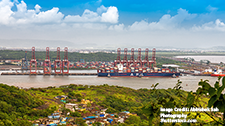Anchoring Indo-Japanese Maritime Relations
Rupakjyoti Borah
Ensuring security of energy supplies and safeguarding sea lines of communication are underpinning increasing maritime ties between the net-energy importers of India and Japan. At the same time, argues Rupakjyoti Borah, strategic cooperation is being spurred by mutual concerns regarding China’s increasingly assertive posture and ambitions in the Indian Ocean and South China Sea.
Related Publications
-
ISDP Annual Report 2023
ISDP’s Annual Report for the year 2023. We look back on 2023, a year in which tensions and conflicts captured the strategic space in ISDP’s focus areas, making headlines around […]
-
EU-Taiwan Semiconductor Supply Chain: Resilience amid the Digital and Green Transition
As the European Union (EU) sets ambitious goals of maximizing a ‘Digital Decade’ through its Digital Transition plan and attaining carbon neutrality in its Green Transition plan, technology becomes the […]
-
Convergence in Vietnam, EU Interests a Harbinger of Indo-Pacific Order?
In March and April, Vietnamese Foreign Minister Bui Thanh Son’s nearly back-to-back visits to the U.S. and China highlighted Vietnam’s increasing penchant for delicate diplomacy with major powers amid the […]
-
Maldives Walking Tight Rope between India and China
Like all the South Asian small states, the Maldives has been subjected to great power politics. There are five principles of Maldives’ foreign policy (mostly reciprocating with India’s ‘Panchsheel’) and […]
-
Jagannath Panda: “India’s INSTC Commitment Is Not Reliant on Western Endorsement”
Interview conducted by Ilya Roubanis, Caucasus Watch The International North-South Transport Corridor (INSTC) is a 7,200km mostly overland network stretching from India to Russia, via Azerbaijan and Iran, branching […]




